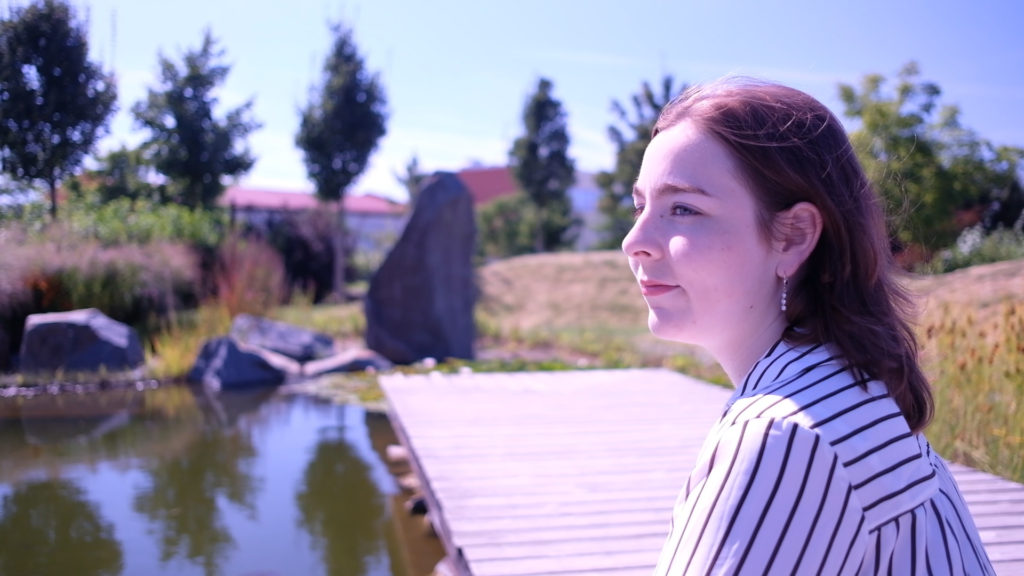I am grateful for the valuable experience I gained at a prestigious university in the USA
PhD student Veronika Šedajová recently returned from a five-month internship which she did in the research group of world’s leading expert in materials chemistry, Yury Gogotsi, at Drexel University in Philadelphia. His laboratory focuses, among other things, on the study of MXenes and other 2D materials, the application of which includes sensing, energy storage technology, water purification, optoelectronics or medicine. How did she manage her stay with respect to the pandemic restrictions? Did she manage to prepare her own MXene? We are happy to share the answers to some questions.

What expectations did you go to the US with?
Before my internship, I worked with MXenes only marginally. So I expected to learn how to synthesize them, process them, and manipulate them, and then try to master the process of preparing electrodes and new ways of testing them. The plan was also to use our carbon materials from CATRIN to prepare flexible electrodes for supercapacitors.
Which of these goals did you manage to accomplish?
I dare to say I’ve accomplished most of the goals and learned a lot—even more than I’d hoped for, which I’m very glad for. I learnt the synthesis of MXenes, their further processing, the preparation of flexible electrodes and consequently composites with our graphene derivatives from Olomouc. I also tried new ways of testing supercapacitors. I tremendously benefitted from the opportunity to work in another research group and gain experience in a different workplace. I’m truly grateful for the time my colleagues in the US invested in teaching and training me. What also helped me was that, thanks to the equipment at CATRIN, I was already able to evaluate various techniques and had experience with measurements.
Are you going to continue this cooperation, for example, planning a joint publication?
Definitely! I don’t want to jinx it, though. At least two publications are planned together with colleagues from the internship in the US. At the same time, I’ll still be working with Professor Gogotsi’s group on other projects, which I’m very excited about.
What, apart from professional growth, has brought the greatest benefit?
Certainly a chance to meet so many people from different parts of the world who are also great scientists. I feel I’ve progressed more than just workwise. Five months in a foreign country, and during a pandemic, is bound to change you a little, whether you want or not. From a professional point of view, the greatest benefit is to see and understand how research groups operate elsewhere.
Which of these aspects would you like to see in Olomouc and, conversely, what could inspire colleagues in the USA?
This question is very difficult in view of the different sizes of the two workplaces. However, I greatly appreciated the communication, close cooperation and openness there. I checked that Czechs really do have a specific way of thinking. “Golden Czech Hands” and the ability to come up with solutions to make things simpler and more feasible was what I tried to make the most of. Having seen a whole new world, people and possibilities, gained a new perspective on science and how academia works, some things are clearer to me now. I’m really very grateful that my supervisors Michal Otyepka and Aristides Bakandritsos sent me to such a prestigious university.
What surprised you most?
The responsibility with which the pandemic situation was approached and the size of the city.
Presumably, these two circumstances were also major complications, weren’t they?
I have to admit that yes. Regarding the security situation in the city, I had to comply with the anti-epidemic measures one hundred per cent, learning where not to go or, on the other hand, which streets were safe. Caution was needed all the time. In this, I have come to appreciate Olomouc in terms of what a safe city it is.
What lays in store for you in the next few weeks/months?
In the next few days, we plan to finish a publication I started working on before my internship. Subsequently, my colleagues from the US will send me my samples so that I can continue to optimize the preparation of electrodes. After that, as I mentioned earlier, we plan to publish the results. And since I’m going to do my fourth year, I’m starting to plan my dissertation and graduation.
Veronika Šedajová was interviewed by Martina Šaradínová


